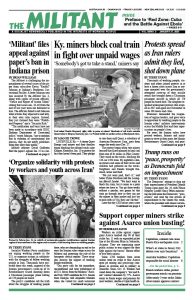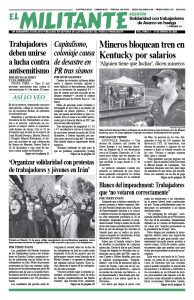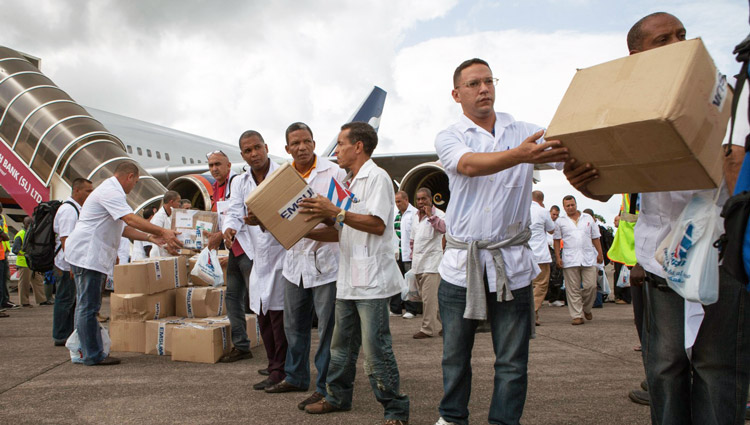Below is the preface to Red Zone: Cuba and the Battle Against Ebola in West Africa by Enrique Ubieta Gómez, just published in English and Spanish. Copyright © 2019 by Pathfinder Press. Reprinted by permission.
Red Zone: Cuba and the Battle Against Ebola in West Africa is not a book about doctors, epidemics, or medical care, as central as those topics are to the remarkable account you are about to read. First and foremost, the book is “about the solidarity and internationalism that are at the heart of the Cuban Revolution,” as author Enrique Ubieta told the audience at its launching in Havana in February 2016.
In August and September 2014, the World Health Organization and the governments of three West African countries, Liberia, Sierra Leone, and Guinea, issued international calls for help in combating the largest epidemic on record of the deadly Ebola virus. In contrast to the meager and callously self-serving response of capitalist powers, especially the United States, France, and the United Kingdom, Cuba’s revolutionary socialist government acted rapidly.
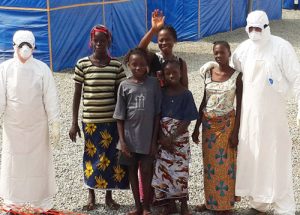
Within three days of a call to Cuban president Raúl Castro from Ban Ki-moon, secretary-general of the United Nations, more than 12,000 Cuban medical professionals had volunteered, many with experience responding to epidemics and disasters from Haiti to Pakistan to Central America. Of those volunteers, 256 Cuban doctors, nurses, and health care technicians were selected and trained for the mission.
Eight months later, when the last member of the Cuban medical brigade returned home in May 2015, the Ebola epidemic in West Africa had been virtually eradicated.
Ubieta’s firsthand reporting of this fight, told largely through accounts by the Cuban participants themselves, paints a graphic picture of the social disaster that unfolded in these three countries in 2014 and 2015, and how the enemy was defeated.
The volunteers were given intensive training in handling the highly lethal Ebola virus at Cuba’s world-famous Pedro Kourí Institute of Tropical Medicine. The first teams were on their way to the crisis areas in a matter of weeks.
The small island nation of Cuba provided what was most needed and what no other country even tried to deliver: hundreds of doctors, nurses, technicians, and public health specialists on the ground, caring for thousands of desperately ill human beings and their families and communities traumatized by the killer disease.
For the Cuban people and their communist leadership, such a response was nothing new. It was simply one more example of the political course that began with the January 1959 triumph of a revolution that brought to power a government representing working people. A government of, by, and for the humble, as they often describe it. That course — at home and abroad — is one of solidarity, not charity. From Asia and Africa, to Latin America and the Caribbean, they have shared in the hardships and struggles of others seeking national sovereignty and independence.
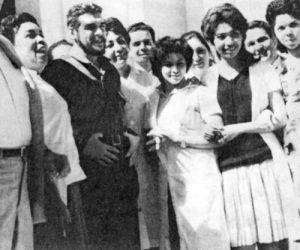
To give but one example, in the very first years of the revolutionary transformation of Cuba, the new government sent not only weapons but also doctors to aid the embattled National Liberation Front of Algeria fighting for independence from France. And on the ships returning to the island, Cubans brought war orphans and wounded combatants for medical care and education.
Sending doctors to Algeria in the early 1960s “was like a beggar offering his help,” said Cuba’s then Minister of Public Health José Ramón Machado Ventura some thirty years later. “But we knew the Algerian people needed it even more than we did and that they deserved it.” No words better capture the internationalism of the Cuban Revolution.
❖
This unmatched record explains why the presentation of the Cuban edition of Zona Roja at the 2016 Havana International Book Fair was a high point of that annual event. Among those in the standing-room-only crowd were two dozen members of the volunteer Cuban contingent that waged this fight.
The atmosphere in the room was filled with camaraderie among the doctors and nurses who had answered the call for help. Their sense of collective pride at having taken part in this battle — and, for the rest of us present, the respect and admiration for these internationalist volunteers — was palpable.
The heads of the Cuban medical brigades in Sierra Leone, Guinea, and Liberia each spoke, along with the author and Abel Prieto, former longtime Cuban minister of culture and now head of the Office of the José Martí Program in Havana. Prieto saluted “the selflessness, principles, and convictions” of the Cuban volunteers, saying that “they exemplify the purest ideals of the Cuban Revolution.”
He reminded participants of the words of Fidel Castro, historic leader of the Cuban Revolution, at the opening of the Ebola mission in October 2014: “The medical personnel who will go anywhere to save lives, even at risk of losing their own, are the greatest example of solidarity a human being can offer, above all because they aren’t motivated by material interest.”
The discipline, courage, sense of humor, and joy of these Cuban volunteers comes through time and again in these pages. The political course and moral values their actions embody are an expression of the social relations only a truly socialist revolution can produce. They register the economic, social, and political conquests working people in Cuba have made since they freed their country from US imperialist domination and took power out of the hands of domestic and foreign capitalists and plantation landowners.
Many have asked, “Why did no other country in the world respond to the Ebola epidemic the way Cuba did? Can’t Cuba’s medical system and internationalist missions be emulated by other countries?” The answer is no secret. Cuba’s proletarian internationalism is the product of a socialist revolution. It cannot be grafted onto other nations, nor reproduced by men and women who have not been transformed by a similar revolutionary class struggle.
❖
The first edition of Zona Roja was published by Casa Editora Abril, the publishing house of Cuba’s Union of Young Communists.
These new editions — Red Zone in English, Zona Roja in Spanish — join the arsenal of Pathfinder books and pamphlets that tell the truth about the Cuban Revolution to new generations of workers, farmers, and youth in the United States and worldwide. These titles offer political lessons to study and examples to emulate for working people and youth everywhere. For those fighting for health, safety, and dignity on the job. Against imperialism’s bloody and never-ending wars and assaults on national sovereignty. For an end to the discrimination and brutalities faced daily by African Americans, women, immigrants, and other oppressed layers. Against debt slavery, farm foreclosures, and capitalism’s destruction of our natural environment. And all the other ravages of capitalist property relations.
The record the Cuban internationalists recount here helps us understand what a socialist revolution is. Eradicating exploitation changes not only the circumstances in which we live and work. It begins to change what capitalism teaches us is “immutable” human nature. Cuba’s example points us to the only class forces that can and will make it possible for working people to fundamentally transform ourselves as we transform social conditions.
❖
Red Zone also provides a compelling refutation of the US government’s slanders against Cuba’s internationalist medical cooperation.
Precisely because the example of this cooperation is so powerful and so welcomed by working people around the world, Washington has intensified efforts to peddle the lie that Cuban doctors, nurses, and medical technicians who volunteer for these missions are victims of “exploitative and coercive labor practices,” “human trafficking,” even “modern slavery!” The US rulers aim in particular to entice Cuban doctors with the siren song of the princely incomes that most physicians in the United States and other capitalist countries have been taught to expect as “fair” remuneration for the embossed piece of paper on their office walls.
Washington’s slanderous campaign is simply another front in the six-decade-long economic war by US Democratic and Republican administrations alike aimed at isolating and economically strangling the Cuban people. These measures, once again tightened since 2017, have the objective of ultimately restoring control of Cuba’s land, labor, factories, and natural resources to capitalist hands, from which they were ripped by working people in the opening years of the revolution.
There is no better answer to the US government’s efforts to tarnish the Cuban Revolution’s medical internationalism than the response of thousands in 2014 to the request for aid in the fight against Ebola. When members of the brigade were on the ground, millions in Cuba closely followed the news of what was happening there. Despite concerns for the volunteers and the risks of introducing the disease into Cuba, the example set by the volunteers in West Africa was deeply popular on the island.
Cuba’s system of primary health care and medical treatment, at no cost to individuals and their families, is a conquest of the revolution that the Cuban people justly take pride in. It’s not a commodity bought and sold for profit. It starts from saving lives, from the right of every person to health care, and from basic human solidarity at home and abroad.
In addition to the victory in the battle against Ebola, readers will learn in Red Zone how Cuban medical brigades helped combat a deadly cholera epidemic in Haiti in 2010. How such internationalist missions have provided desperately needed medical and other disaster relief in countries across Central and South America and the Caribbean to Pakistan, the Pacific islands, and beyond. How Cuban medical personnel were already at work in thirty-two African countries when the Ebola epidemic erupted.
❖
The exemplary conduct of the Cuban volunteers won the admiration of other medical personnel with whom they shared the trenches, both health workers from the three West African countries and those from elsewhere around the globe. Ubieta also describes the process, sometimes more winding than others, through which the volunteers won the trust of patients and their families, many of whom ended up asking for themselves or loved ones to be treated by Cuban doctors and nurses.
The Cuban volunteers maintained the most rigorous safety procedures, especially in the “red zone” — the area of treatment centers with the highest contamination levels, where patients were quarantined. Only one Cuban contracted the disease; he recovered and returned to the front lines of the battle two months later.
Despite the “space suits” and other necessary safety measures, the Cubans treated the patients and their family members as fellow human beings, not a biohazard. They fought for the life of every patient, even when doing so wasn’t “cost-effective,” since the person seemed to have little chance of survival. If a patient was going to die, they would die with dignity, the Cuban doctors and nurses insisted. And their families would know that everything possible had been done to cure them.
The volunteers took an interest in the patients, asking about their work and their families. They called patients by their names, not by a bed number. In the often overcrowded treatment centers, they never asked a patient lying on the floor to stand up to be examined. These were the social attitudes the patients came to recognize in the Cuban doctors and nurses, even when they were sealed in their “astronaut”-like bodysuits and masks.
❖
The Cuban volunteers in West Africa were part of the Henry Reeve International Contingent, launched in September 2005. President Fidel Castro initiated the contingent that year in response to Hurricane Katrina. The hope was they would be allowed to provide assistance to residents of New Orleans and the surrounding Louisiana bayous devastated by the storm.
The US government, however, flatly rejected Cuba’s offer to send 1,500 medical personnel to help. Instead, Washington brutally left working people there to fend for themselves, knowing full well that medical attention, food, and water were woefully lacking.
This contempt for working people’s lives and welfare on the part of the wealthy US capitalist families — and of the government and twin political parties through which they exercise their exploitation and class rule — has been repeated many times over, both before and after Katrina. In the past few years alone, we’ve seen the social catastrophe in the wake of Hurricane Maria in Puerto Rico in 2017; the devastation in Florida and the Carolinas in 2019; and countless floods, wildfires, and other disasters in Texas, California, and across the United States. And around the world.
While many such occurrences are natural in origin, the catastrophic social consequences for tens and hundreds of millions are a product of capitalism.
As this book goes to press in late 2019, a new outbreak of Ebola in the Congo, second only in scope to the West Africa epidemic, has passed its one-year mark and still threatens to spread. Once again, the response by the profiteers’ governments and “charitable” institutions hasn’t gone much beyond declarations of “a public health emergency of international concern.” Meanwhile, the capitalist owners of giant US and other multinational pharmaceutical corporations compete for market share for their new Ebola vaccines and treatments.
Cuba’s “army of white coats,” as Fidel Castro aptly called them in 2014, acts in stark contrast to capitalist “medicine.” Serving in 64 countries, these volunteers often work and live in the most remote rural regions or worst-off urban working-class neighborhoods. These are areas that profit-maximizing hospitals and “health-care” conglomerates stay as far away from as possible. As do most physicians who graduate from medical school in the capitalist world, convinced that their diplomas entitle them to big bucks and the best comforts their class privilege can offer.
The goal of Cuba’s internationalist cooperation is not simply to provide needed medical personnel where none currently exist. The Cuban government strives to contribute to building a medical infrastructure in these countries wherever possible, helping establish medical schools in some countries, bringing students to Cuba for medical training at little or no cost, and assisting in developing networks of primary care clinics.
Cuba’s revolutionary government has extended medical assistance to countries with which it doesn’t have diplomatic relations as well. That was the case, for example, when 2,400 doctors, nurses, and others went to the mountainous Kashmir region of Pakistan in 2005 following the 7.6 magnitude earthquake that killed some 80,000 human beings there. Cuban medical volunteers set up 30 field hospitals, later donated to the Pakistan government. Cuba provided 1,000 scholarships to students in the region to study at the Latin American School of Medicine in Havana.
Like other missions abroad, the fight against Ebola was a learning experience for the Cuban medical personnel involved. This was especially true for younger brigade members, who have never themselves (nor, as years go by, their parents or even grandparents) lived or worked under the dog-eat-dog social relations bred by capitalist exploitation and rendered even more brutal by imperialist oppression.
In Red Zone, Ubieta said at the 2016 launching, “I write about the seeds we are sowing inside and outside of our selves. Every time a Cuban doctor takes part in a mission abroad, they renew themselves as revolutionaries.”
Some people contend “that the epic moments of the Cuban Revolution are a thing of the past,” Ubieta noted, and “that Cubans should concern themselves only with their own individual, everyday problems, which can sometimes be overwhelming.
“And then suddenly you hear the battle cry, like the request we received for aid. And thousands turn out, volunteering to go. Solidarity is very much alive in the Cuban people.”
December 7, 2019
